I’ve been to more than 1,500 sentencing hearings since 2009, and I still get nervous at every one. Friday was no different. I sat in Santa Ana, waiting for my good friend Matthew Bowyer to walk into Judge Holcomb’s courtroom.
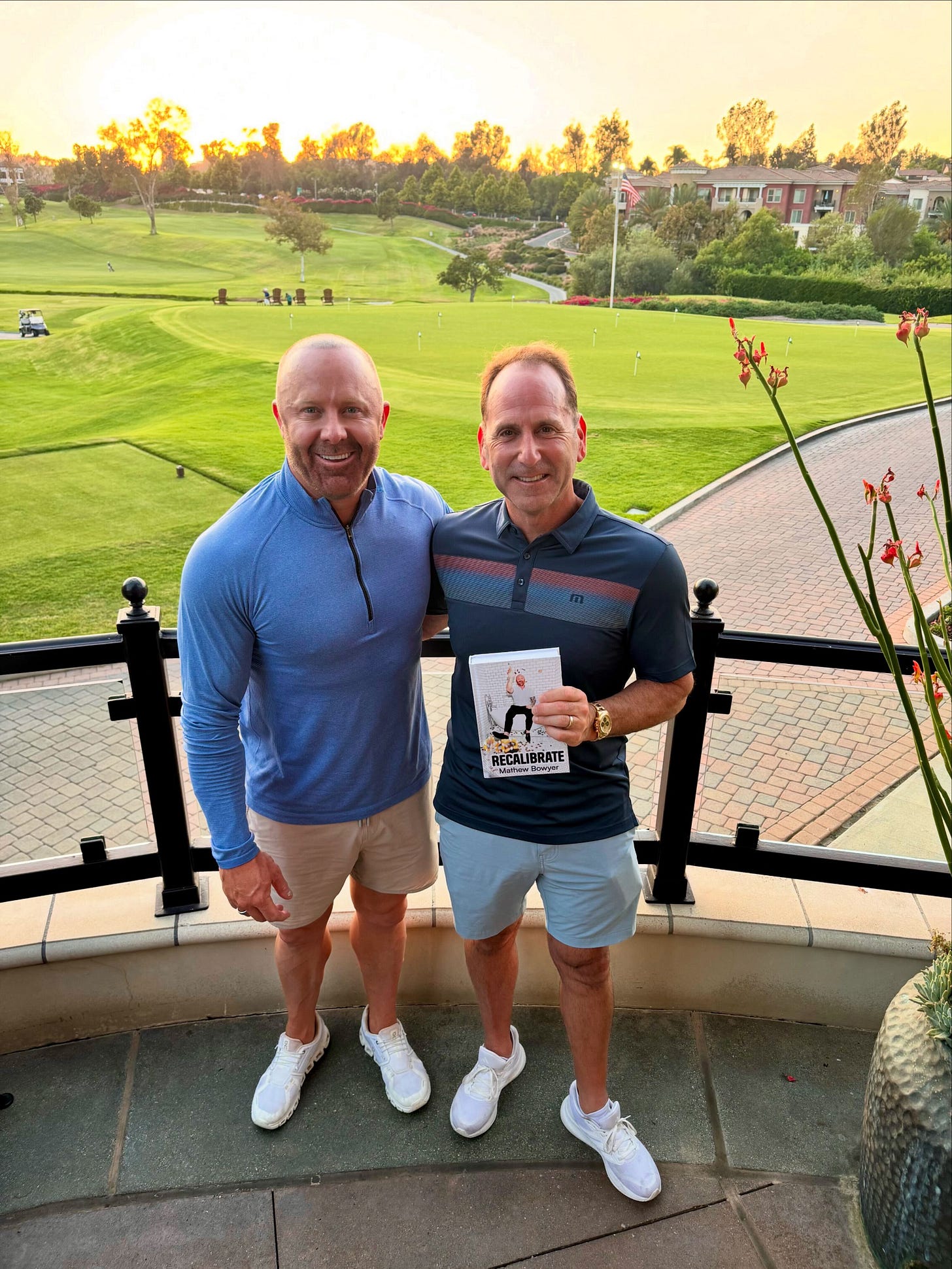
I’ve sat in courtrooms where defendants had two people behind them. Matt had so many that the marshal had to clear space downstairs. That doesn’t happen at a federal sentencing unless the person has been doing the work, day after day, long before the judge takes the bench.
Accepting Reality Early
When Matt’s home was raided by the FBI in October 2023, everything changed overnight. Agents with guns at his chest, his life turned upside down in an instant. A lot of people freeze at that moment, or they spend months in denial. Matt didn’t, and one big reason is because he had Diane Bass.
Diane is a criminal defense lawyer in Orange County. Our team has worked with her for more than ten years, and I can tell you she does something most lawyers don’t do well: she gets defendants to face facts quickly. She told Matt the government was going to get its conviction. She told him there would be a sentencing hearing. And she told him what he did between that raid in October and sentencing day would influence how long he was away from his wife and five kids.
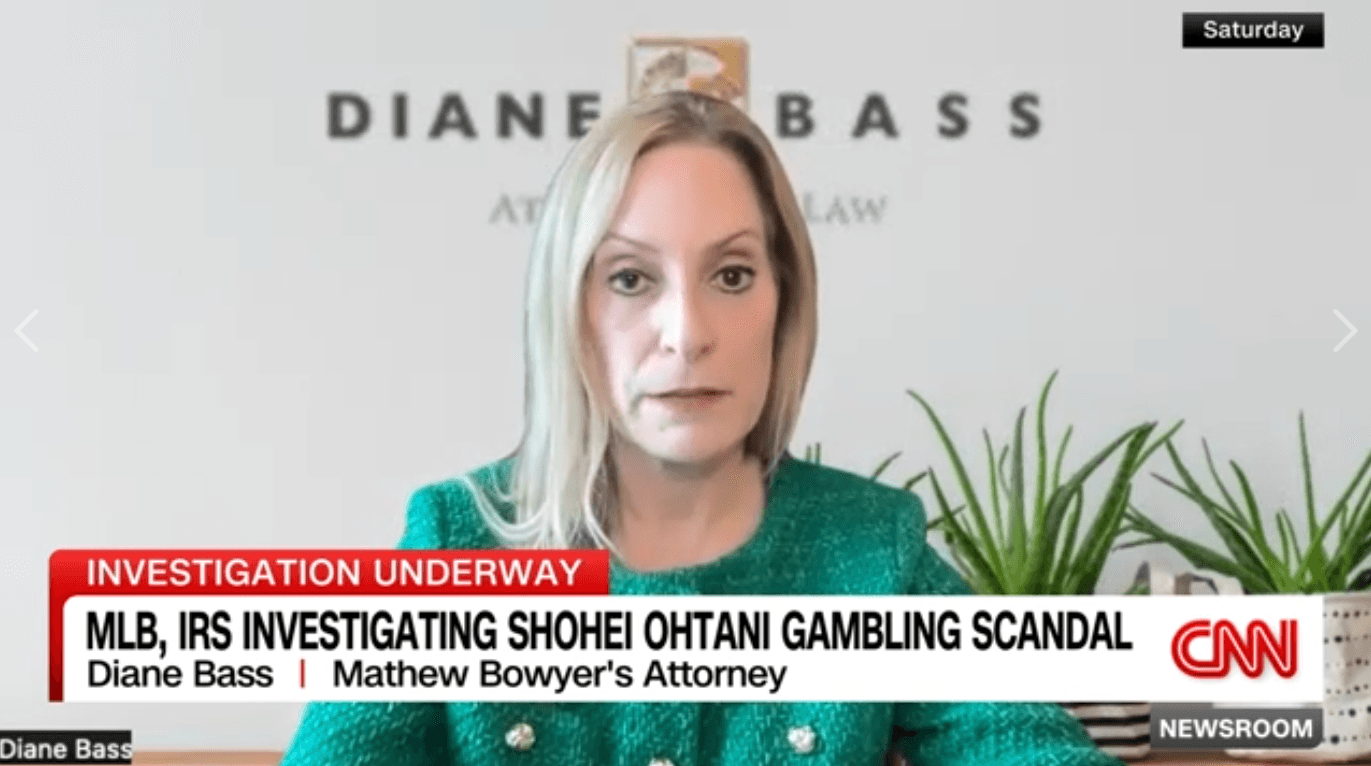
Then she told him to call me.
Matt made that call, and from that moment forward, we worked as a team, Diane handling the legal strategy, my team and I guiding him on how to build a record beyond the charges, and Matt doing the hard part of carrying it out. The goal was simple: by the time he stood in front of Judge Holcomb, the court would see the totality of his 50 years, not just his role as a bookmaker, but as a husband, father, and contributor.
Building Without Guarantees
Once we began working together, the first conversation was about control. Diane had already made sure Matt understood what was coming: there would be a conviction, there would be a sentencing hearing, and prosecutors would want to define him only by his conduct as a bookmaker. What we all agreed on was simple: he couldn’t control any of that. What he could control was how he responded.
So he started writing. Not in one burst, but slowly. A handful of pages here, a scene or memory there. Then he’d look at it again and realize he wasn’t going deep enough. He’d tear it up and start over. That cycle repeated itself hundreds of times. Writing a book like Recalibrate wasn’t just to say, “Hey, I wrote a book.” It forced him to look in the mirror and examine, line by line, the choices and behaviors that led him into federal court. That process isn’t easy. Introspection rarely is. It takes time, rewrites, and a willingness to put things on paper you’d rather leave buried.
Two years later, those pages turned into an Amazon best-selling book, published only days before sentencing.
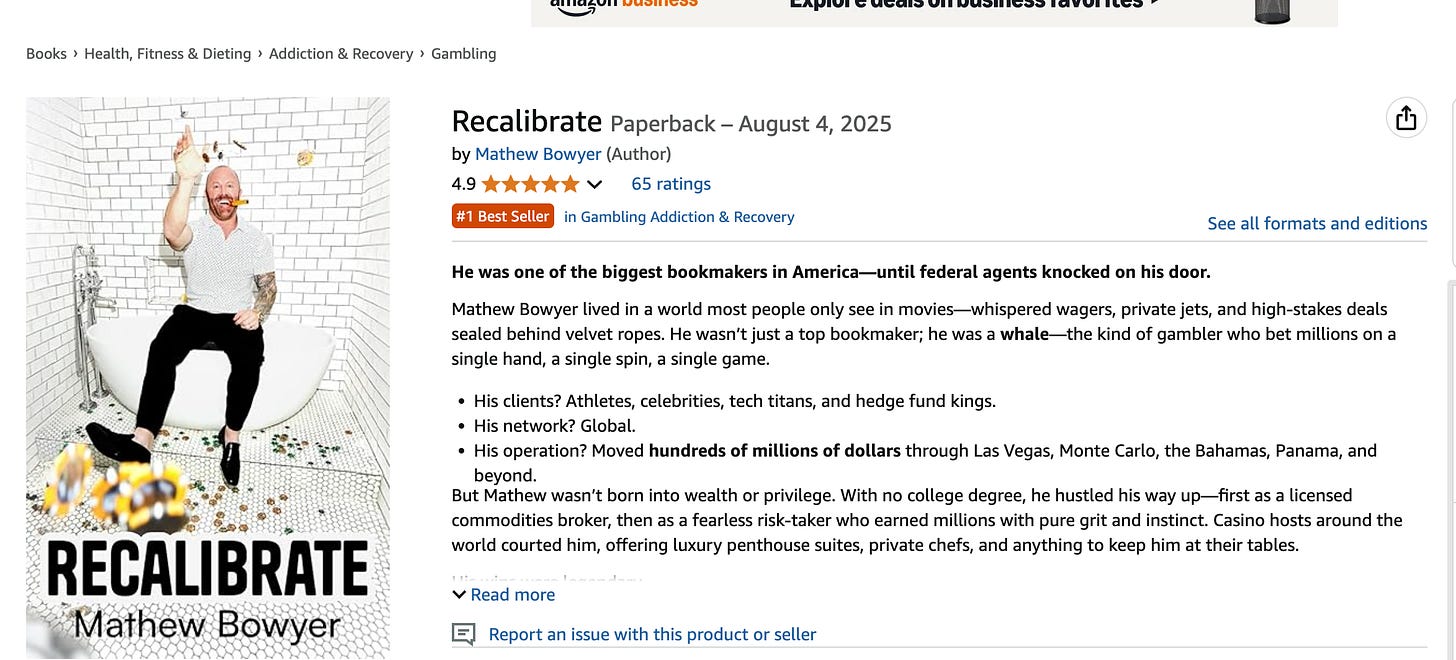
Matt made clear right in the introduction what he was trying to do:
“I’m not perfect and I’m not pretending to be, but what you’ll get in these pages is the truth; raw, unfiltered, and real. I lay everything on the line because I’d rather be judged for who I am than praised for who I am not.”
Those words came from two years of sitting with the discomfort of telling the truth, rewriting, and forcing himself to go deeper each time.
At the same time, he began to establish an online presence. He had no background in social media. That didn’t stop him. He opened an Instagram account, filmed a short video, and posted. Then he did it again the next day. He always wanted honest feedback. Matt would text me, “You’ve done this a while. I value your opinion. Break it down for me, good and bad. The harder and more direct you are, the better. I must improve and need honest feedback.”
I gave him my honest advice, and he (almost!) always took it.
Looking back, the early posts reached almost no one. No different than me when I started. Most people in his situation would have stopped. He didn’t. Over time, the small audience grew, and eventually his following climbed into the tens of thousands.
Then came another step: agreeing to speak with me in public about his crime. USC’s Marshall School of Business gave him the opportunity. He had to stand in front of hundreds of students and talk, not about the jets or Rolls-Royces, but about consequences. That was new ground.
He poured close to 100 hours into preparing. Drafts, rewrites, practice runs. I would get texts from him at 4 am, “Wrote the open, what do you think?”
He invested the time because he wanted the students to understand the fallout from bad choices. When he finally took the stage, he did something most defendants never attempt; he spoke openly about his crime in a way that wasn’t self-serving.
Diane’s ability to help prepare for that, knowing how the government, the press, and the court would view it, was critical. This was a high-profile case with national coverage. There couldn’t be any mistakes.
The Ohtani Shadow
There’s no way to tell Matt’s story without bringing up Shohei Ohtani. Matt was the bookmaker in this case. Even though he’s been clear that Ohtani never placed bets with him, he can’t control what people online believe. Thousands of comments insist otherwise. “Of course he knew,” they write, as if repeating it makes it true.
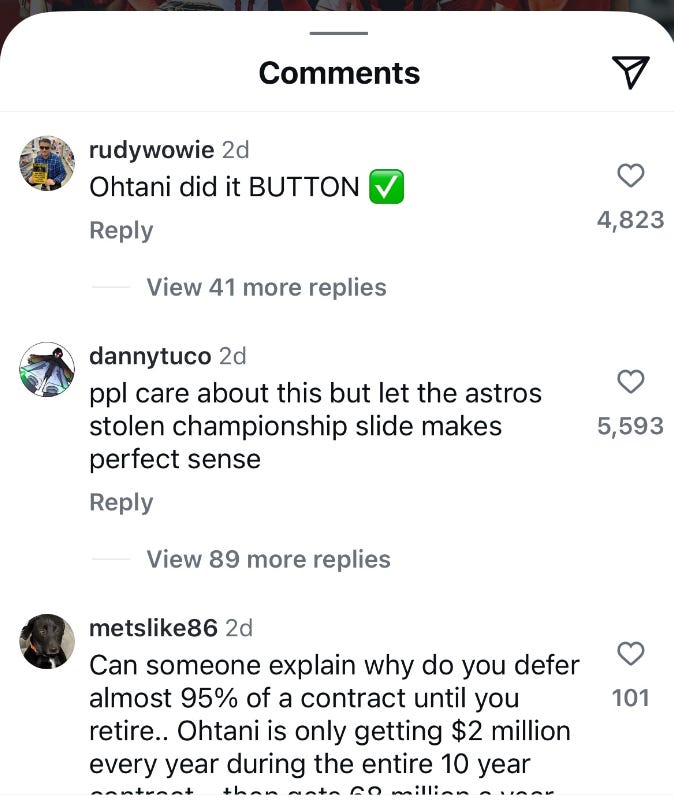
He also can’t control the people who take pleasure in his pain. That comes with the territory. Matt wrote about the millions made, golfing with Charles Barkley and Travis Kelce, joining the Lakers team on flights, the comped penthouses in Vegas, and even the $4.6 million Super Bowl bet (he won). Some people will always look at that life with envy, and envy quickly turns to judgment when things fall apart. We live in a country where many celebrate the downfall of others. They cheer when someone who had more loses it all.
That never stopped him.
While the courtroom was packed with supporters yesterday, that doesn’t mean every friend stuck around. Some did run from him. They decided it was safer to distance themselves, to treat him as toxic. That’s the reality when your name is in headlines and the FBI raids your home.
Matt didn’t waste energy on those who disappeared. He was grateful for the hundreds who stayed. When the marshal had to redirect people to the jury room downstairs because there weren’t enough seats, it reminded him to focus on what he had, not what he lost.
He also had to deal with worldwide media coverage. ESPN, CNN, Rolling Stone, Fox News, each story framed in a way that suited their business model. Matt didn’t spend time calling some of them “hit pieces.” He understood the point of their work: get readers, sell ads, drive attention. Instead of fighting it, he tried to see it from their perspective.
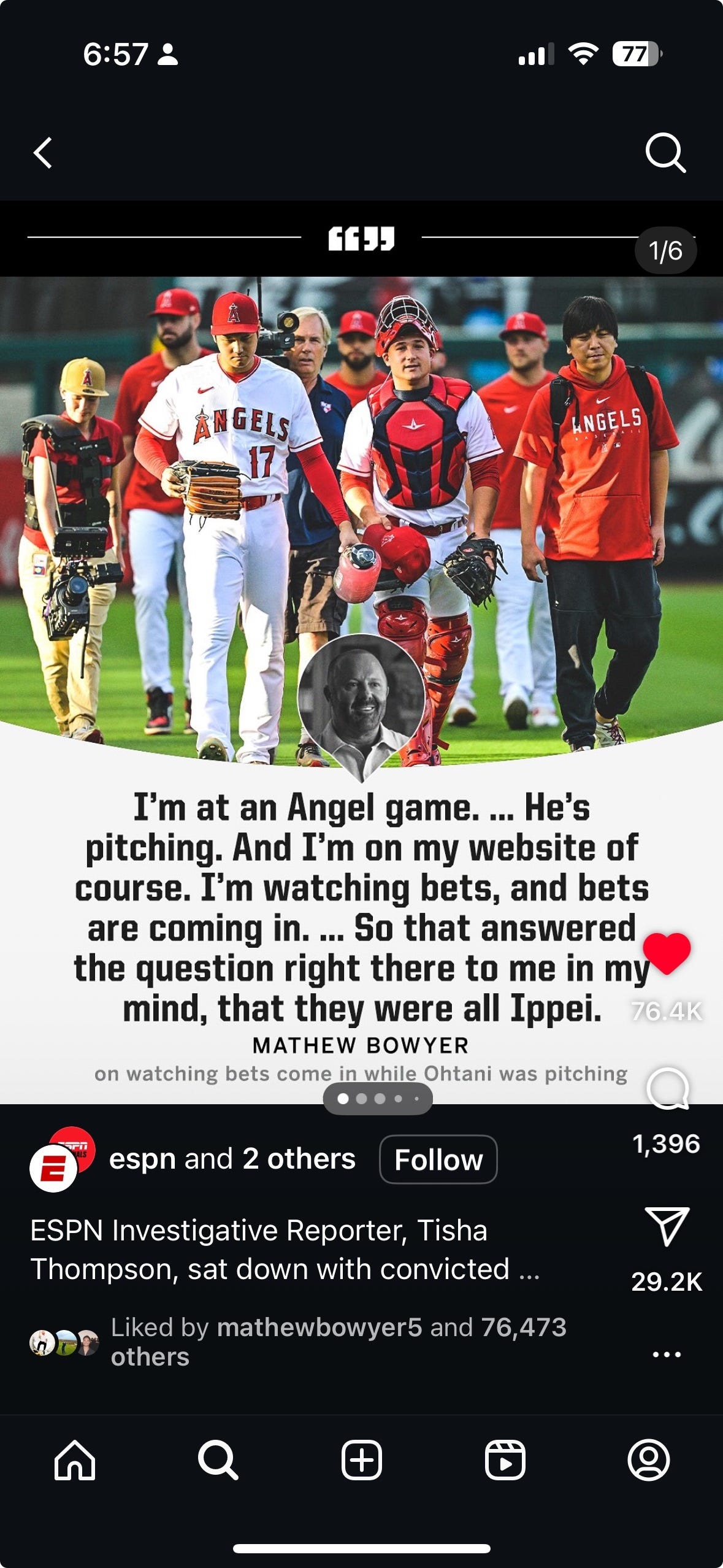
That’s one of Matt’s strengths. He has a way of putting himself in someone else’s position and asking the right questions. If it’s a reporter, a prosecutor, or a judge, he’ll think: what do they actually see when they look at me? What do they know about me, and just as important, what don’t they know? What assumptions are they making? And if those assumptions aren’t in my favor, how do I chip away at them over time? Not with one big swing, but slowly, steadily, showing something different.
Diane helped reinforce that. She kept reminding him that every stakeholder, the government, the probation office, the pretrial services officer, the media, the judge, would have a perception of him. The work was about influencing that perception with actions, not promises. And in a moment that made the whole courtroom laugh, Diane told Judge Holcomb, “Matt listened to my advice, most of the time.” Judges notice when lawyers are candid. It makes everything else they say more believable.
The Outcome
The guidelines in Matt’s case called for 41 to 51 months in prison. The probation officer recommended 36 months, and at sentencing, the government was seeking a sentence of 15–21 months. The prosecutors argued for a prison sentence, full restitution, and a message of deterrence. They said his case had too much visibility for the court to go easy.
Judge Holcomb saw things differently.
He sentenced Matt to 12 months and one day with only two years of supervision. That sentence matters for a very specific reason: with the extra day, Matt qualifies for good time credit. If it had been a straight 12 months, he wouldn’t. That one day changes his eligibility to shave weeks off his time. Judges don’t always bother with details like that. Judge Holcomb did.
He also recognized what Matt had done over the last two years. He spoke about the support in the courtroom. He mentioned Matt’s volunteer work with Prison Professors Charitable Corporation (Diane did a terrific job of addressing the nonprofit work early in her remarks). When the hearing ended, Judge Holcomb did something you don’t often hear from the bench. He took a moment to wish Matt well, while acknowledging the massive support behind him.
That support didn’t erase the conviction or the prison term, but it showed the court considered the totality of Matt’s life.
And Diane’s ability to manage the government’s arguments, while positioning Matt’s volunteer work and public record as credible rather than self-serving, played a role in how the court handled a case this visible.
Why Recalibrate?
When Matt started writing Recalibrate or filming short videos for Instagram, he didn’t know what the payoff would be. He knew prosecutors could try to use it against him, and they did. At sentencing, the prosecutor argued his visibility meant the court needed to impose a prison term to send a message. She said most cases get no attention, but because Matt’s case was public, the sentence needed to show deterrence.
Here’s the important point: even if Judge Holcomb had gone higher, even if the sentence had been 36 months or 41 months, the work he did over the last two years positioned him for the hardest part: coming home from prison with a felony.
Matt would still walk into prison with a published book in his name. He would still have a social media presence, which he built from nothing. He would still have shown his daughters and young son that when life collapsed, their father chose to build.
As Matt wrote in his introduction:
“I don’t expect your sympathy. I hope to earn your respect.”
That’s what this was all about. Not sympathy. Respect.
Lessons for Others
For anyone reading this who is under investigation, waiting for sentencing, or already preparing to surrender, Matt’s story offers some practical takeaways.
Segment the work. He didn’t try to overhaul his life in one shot. He wrote a few pages at a time. He learned social media one post at a time. He started with Prison Professors Charity, hour by hour. Breaking it down kept him moving forward instead of being overwhelmed.
Do the next step in front of you. From the moment the FBI raided his home in October 2023, he focused on what he could do that day. The first draft of the book. The first video. The first interview with Michael Santos. The first outline for a lecture. It wasn’t about solving everything at once. It was about stacking small steps and persuading.
Think about how others will see you. Diane drilled this into him. It’s not about what you think of yourself. It’s about what the judge, the prosecutor, and the probation officer will see when they review your record. Every action and everything we created was measured through that lens.
Don’t hide. Most defendants retreat and try to stay invisible. Matt didn’t. He spoke openly, posted publicly, and wrote a manuscript detailing everything, unfiltered. His efforts brought criticism. It brought judgment. He chose to do it because silence would have left him with nothing to point to when the day of sentencing arrived.
Stoicism in Action
If there’s one philosophy that captures Matt’s approach, it’s Stoicism.
He couldn’t control how reporters covered his case. He couldn’t control what strangers on the internet believed about Ohtani. He couldn’t control the prosecutor, arguing that his visibility required a harsher sentence.
What he could control was his response. He could sit down each night to write. He could open his phone and post a video. He could put in the hours to volunteer with Prison Professors Charitable Corporation.
Matt didn’t spend his time chasing down every false comment online. He didn’t argue with critics. He worked. He documented. He created. He showed his kids that even after an FBI raid and federal charges, their father wouldn’t cower: He would recalibrate, overcome.
For anyone facing a government investigation or preparing for sentencing, Matt’s story is proof of what can be done. You don’t control the charges. You don’t control the headlines. You don’t control what critics say. You control what you do next.
Justin Paperny
P.S. Go buy Recalibrate!



